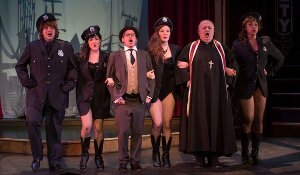
Mental Health 101: Finding Nirvana in a Cup of Coffee
By Deborah Rankin
"You can find meaning in reading the Scriptures or in a flower," so says Dr. Camillo Zacchia, a clinical psychologist at the Douglas Mental Health University Institute, while emphasizing that whatever our path to peace may be, "connection to people is the purpose" in life.
Zacchia made these remarks recently at a talk he gave on the art of life/work balance as part of the line-up at the 17th Blue Metropolis Montreal International Literary Festival, "Le Pouvoir Des Mots" (The Power Of Words).
The 60-minute reading and discussion at Paragraphe Bookstore, "Mental Health 101: Finding Nirvana in a Cup of Coffee and Other Secrets of Happiness" featured references to some of Zacchia's best-loved poems and novels, all pointing to the simple truth that joy is often experienced in the small details of daily life - a helpful insight in a time when many feel overwhelmed by the stress and intense demands of modern life.
However, the presentation ran overtime to more than 90 minutes as listeners continually asked questions and made comments, with Zacchia patiently accommodating them, then offering to extend it for those wanting to stay afterwards.
The event was part of a series on mental illness and wellness exploring themes of depression, resiliency, and schizophrenia through activities combining literature and medical expertise, hosted by the Blue Metropolis Festival in collaboration with the Douglas Institute.
These included a lecture and workshop poetically titled "Song of Schizophrenia" animated by Douglas Babington (aka Dougie Shoals), integrating the experience of his mentally ill sister through a collection of poems, followed by a lecture on schizophrenia by Dr. David Bloom, Medical Chief of the Douglas Institute.
The series on mental health also highlighted the relationship between spirituality and individual, as well as communal well-being, through literary readings at "Poetry at the Zen Centre", featuring international and Canadian authors including Annehart, winner of Blue Met's First People's Literary Prize.
Zacchia drew on a variety of literary sources for his inspiration in explaining his vision of the Three Pillars of Happiness: Family, Work, & Play. These ranged from the gentle ruminations of Beat poet Charles Bukowski in his signature poem "Nirvana" which recounts the story of a young man on a bus road trip who stops off at a coffee shop where he encounters unpretentious people and finds himself to be sublimely happy in this ordinary situation; to the epiphany of Zacchia's "favorite philosopher" - his 91 year old father - a former POW - who found himself just "happy to be alive" when he emerged from a German stalag where he had been imprisoned after the fall of Mussolini, weighing only 39 kilos, and with the country's currency of no value having to "pack up and leave it all behind" - a journey which lead him from Italy to Canada where he was grateful to be able to make a better life for himself and his family.
Zacchia also encouraged his audience to read "The Beauty of Humanity Movement", a novel about war and displacement, lost love and new-found hope by Canadian author Camilla Gibb which explores the terrain of contemporary life in Hanoi through the eyes of an old man - an itinerant pho chef - who has survived decades of political tumult and hard times under the new economic regime by creating an extended surrogate family of friends and shared memories.
As cliches go, love may spring eternal, and hope may be boundless, but without faith in a higher power or purpose, they fizzle. Faith, hope, and love make up the triad of Christian virtues in the New Testament and faith is a cornerstone of all great religions..Zacchia said that regardless of particular differences, all faiths have a common denominator: they provide "codes of moral conduct", enabling human beings to live purposefully in community.
In today's world though, people are often seeking to personalize their faith. His advice to anyone searching for personal meaning is to "find your own symbols" which you can share. He told the story of how as young man, living on a student's income of only $25 a week, he went out and bought a Christmas tree for $5 and decorated it with cardboard decorations that he made himself. Every year at Christmas he hauls out this same tree and decks it out with the original ornaments. And over the years each of his four children have helped to decorate this very same tree with the very same homemade decorations.
Sometimes you have to choose to do something to live fully in the moment he said, recalling the time when he was walking along the shoreline of China Beach in Vietnam many years ago. The history of Southeast Asia was everywhere: craters and individuals who had been napalmed. There was no lack of negative associations. However, this was a momentous occasion: he was there to adopt his children. So he said to himself, "I can't come all the way to China Beach and not dip my toes in the water," So he did, christening the day (in a manner of speaking) that his children came into his life.
As important as it is to live in the present moment, Zacchia said that we can choose to go back to make sense of the past and that it is possible to ask for advice from a loved one, even after death. "Regardless of what you think happens to the body, you never really leave the people that you touch."
To illustrate this point he talked about the enduring appeal of Beethoven's last symphony, Ode to Joy. Zacchia said he gets "goose bumps" whenever he listens to it, yet it was written over 200 years ago..How can this fact be explained? In his view, the emotional connection between the great composer and generations yet unborn was forged centuries back. It is our collective legacy from Ludwig van Beethoven.
As much as connection to others is our purpose, we all still need "time to ourselves to pursue our passions." However, he cautioned against faulty thinking. "Mistrust is a self-fulfilling prophecy," he says. "You must be able to trust or you will never be happy," adding that giving others the benefit of the doubt isn't the same as blind trust.
Other common pitfalls are black and white thinking, or absolute thinking, as well as the phenomenon known as "group think". There is a natural tendency to the latter he says, matter-of-fact, but while cohesive groups can be useful and offer protection, group thinking can be dangerous and start wars, leading to "1984 Animal Farms."
Zacchia advised those in attendance to try to learn something when things go well, If you want to be happy he said, remember the good times. "Catch yourself in moments when you are doing well."
Last Night at the Gayete

|
|
|
|
|
|
The Centaur Theatre's - season is drawing to a close with its final production of Last Night at the Gayety, a musical comedy by Bowser & Blue which runs until May 22nd. |
|
|


